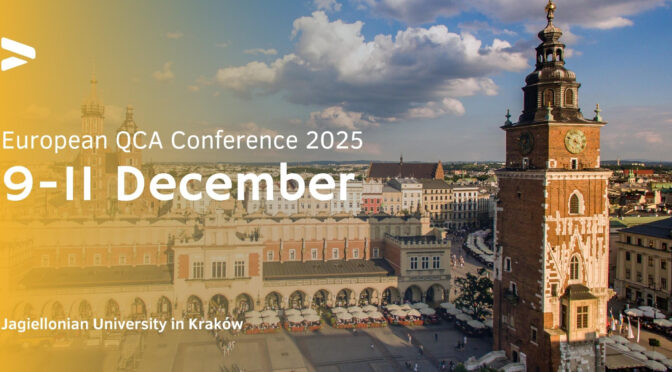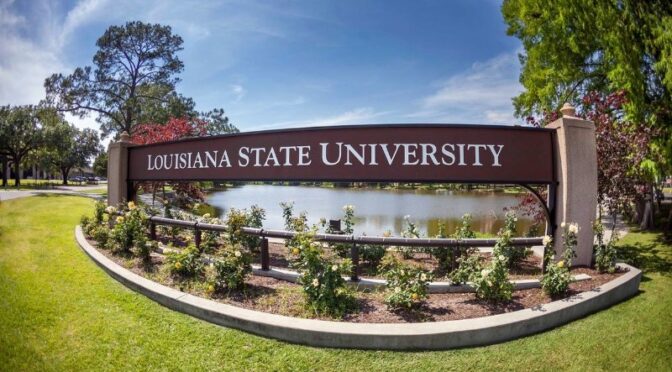Registration is now open for the 5th Annual QCA Conference of the Americas, to be hosted by the Carl H. Lindner College of Business at the University of Cincinnati. Complete details are on our conference website, and you can register for the conference via CARMA.
Category Archives: News
Learning QCA with Software — New Japanese Textbook by NAKANISHI Yoshinobu
NAKANISHI Yoshinobu is Professor of Business Administration at Hosei University, Tokyo.

European QCA Conference 2025
QCA enthusiasts will soon gather at the 13th European QCA Conference 2025 (previously known as the International QCA Workshops) in Kraków, Poland.
EQCA2025 comprises two events:
EQCA Paper Development Workshop
Event is organized for researchers working in various domains who seek constructive feedback on their QCA-based projects and papers. The event is open to researchers at any stage of their QCA journey (an early or more advanced).
Call for papers (deadline: 1st October 2025):
Expert Workshop
We invite experienced QCA researchers to submit abstracts that focus on methodological development of QCA or a related method.
Call for papers (deadline: 1st October 2025):
5th Annual QCA Conference of the Americas
The 5th Annual QCA Conference of the Americas (AQCA2026) will be held March 18-20, 2026 at the Carl H. Lindner College of Business at the University of Cincinnati, USA. See https://compasss.org/aqca/ for the call for proposals, registration process, conference program, and complete details.
The QCA Conference of the Americas (AQCA) provides a venue for the broad, cross-disciplinary community of researchers and practitioners working with configurational-comparative methods and approaches to gather together to present and receive feedback on current research projects, share theoretical and methodological developments, and discuss new directions in configurational-comparative research practices. Bringing together the diverse set of QCA empirical and methodological researchers, AQCA offers a supportive environment for the community to meet, engage in dialogue, network, learn, and collectively move forward on advancing the configurational-comparative perspective.
A summer full of QCA training, including one by COMPASSS Steering Committee member Peer Fiss in Switzerland
Please note the various QCA courses this summer. The courses offer the opportunity to start with QCA or to deepen your knowledge.
For instance, Peer Fiss will be teaching a five-day QCA course as part of the Global School in Empirical Research Methods (GSERM). It will take place at the University of St. Gallen, Switzerland, from June 10-14, 2025. Information on the course can be found here. The goal of this workshop is to provide a ground-up introduction to crisp and fuzzy set Qualitative Comparative Analysis (QCA). Participants will get intensive instruction and hands-on experience with the fsQCA software package and on completion should be prepared to design and execute research projects using the set-analytic approach.
AQCA Early Bird Registration Ends This Week
A quick reminder that early bird registration ends this week for the 4th Annual QCA Conference of the Americas (AQCA2025). The link to register is: https://carmattu.com/aqca2025/
Konstanz Methods Excellence Workshop (komex) – new online and on-site QCA training
The Konstanz Methods Excellence Workshop (komex) are organized by the University of Konstanz, in collaboration with the Methods Excellence Network (MethodsNET) and hosted by the Department of Politics and Public Administration at the University of Konstanz. FInd out more: https://afww.uni-konstanz.de/en/komex/konstanz-methods-excellence-workshops
European QCA conference
QCA enthusiasts will soon meet at the European QCA Conference 2024 (formerly the International QCA Workshop) in Tilburg, the Netherlands. Want to find out more? https://www.tilburguniversity.edu/current/events/european-qca-conference
4th Annual QCA Conference of the Americas
The 4th Annual QCA Conference of the Americas (AQCA2025) will be held April 2-4, 2025 at Louisiana State University in Baton Rouge, USA. See https://compasss.org/aqca/ for the call for proposals, registration process, conference program, and complete details.
The QCA Conference of the Americas (AQCA) provides a venue for the broad, cross-disciplinary community of researchers and practitioners working with configurational-comparative methods and approaches to gather together to present and receive feedback on current research projects, share theoretical and methodological developments, and discuss new directions in configurational-comparative research practices. Bringing together the diverse set of QCA empirical and methodological researchers, AQCA offers a supportive environment for the community to meet, engage in dialogue, network, learn, and collectively move forward on advancing the configurational-comparative perspective.
European QCA Conference 2024
In December, Tilburg University (Netherlands) invites QCA enthusiasts to the European QCA Conference 2024 (formerly the International QCA Workshop).
The Paper Development Workshop will take place on on Tuesday 10 and Wednesday 11 December (for the Call for Abstracts, please visit https://compasss.org/event/12th-international-qca-paper-development-workshop/).
The Expert Workshop will take place on Wednesday 11 and Thursday 12 December (for the Call for Abstracts, please visit https://compasss.org/event/12th-international-qca-workshop-expert-workshop/).




